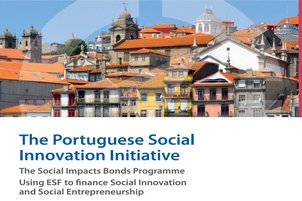Advances with European Social Fund financial instruments

Three new fi-compass publications covering European Social Fund (ESF) topics are now available in our website’s library. These cover useful information and advice about: the implications of State aid rules for ESF financial instruments; a pioneering Social Impact Bonds Programme and Social Innovation Initiative in Portugal; and guidance for ESF managing authorities that are interested in setting up a microcredit financial instrument.
Our new ESF factsheet about State aid is based on the relevant EU Regulation, available fi-compass resources, and the European Commission’s guidance on State aid in European Structural and Investment (ESI) Funds financial instruments for the 2014-2020 programming period.
Whenever public authorities provide funding to support economic activities, care has to be taken to ensure that it complies with the EU rules on State aid. ESF managing authorities implementing financial instruments should ensure State aid compliance at all levels of the implementation. State aid may be present at different levels and compliance with the State aid rules at the final recipient level, in the context of financial instruments, is not enough.
The State aid legal base determines the entire design of the financial instrument and needs to be chosen from the outset as it determines the eligibility criteria, maximum amount per final recipient, minimum private investment, other financial and governance parameters. Download and share this new fi-compass ESF publication about State aid from the website’s library.
Portuguese pioneers
Portugal is the setting for another new fi-compass publication that explains innovative ESF financing instruments. These are being implemented during the 2014-2020 programming period through a Social Innovation Initiative, and the fi-compass publication is a study report focused on the initiative’s Social Impact Bonds Programme.
This study report has been produced to provide practical guidance to other Member States willing to implement such an ESF financing mechanism during the current 2014-2020 programming period. Content also spotlights lessons learned and recommendations that could be used as evidence-based inputs for supporting the European Commission during design for the next programming period’s regulatory framework. Download and share the fi-compass study on the Social Impacts Bond programme under Portugal’s Social Innovation Initiative from the website’s library.
Microfinance for managing authorities
ESF managing authorities are a key audience for the new fi-compass publication providing advice about microcredit financial instruments.
In order to support vulnerable persons and micro-enterprises, a microcredit is a suitable financial instrument to combine EU funds with public and private resources to provide access to finance. Microcredit can be particularly relevant for providing loans for business purposes and to vulnerable groups usually excluded from mainstream finance.
A microcredit should target vulnerable persons and micro-enterprises who have limited access to finance, while small-sized loans normally carry higher interest rates. A dedicated financial instrument backed by ESF could bridge the financing gap and provide more funds at preferential conditions, together with non-financial services. Download and share this new ESF publication from the website’s library to learn more about setting up microcredit financial instruments.
See the range of other ESF advisory information that is available from fi-compass on our website’s dedicated ESF page.

